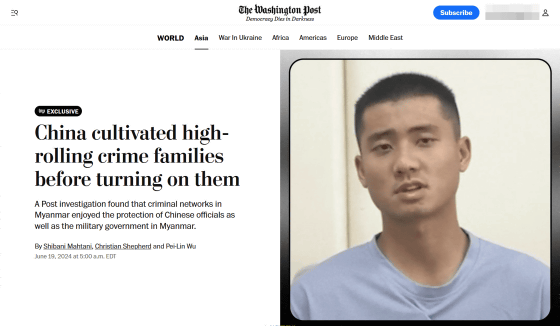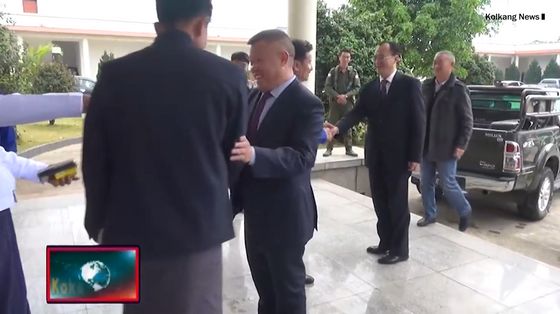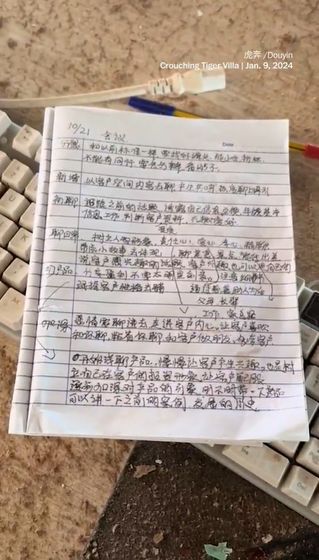A huge Myanmar crime syndicate that tricked foreigners into committing online scams had close ties to Myanmar and Chinese authorities

China cultivated high-rolling crime families before turning on them - The Washington Post
https://www.washingtonpost.com/world/2024/06/19/china-online-scams-myanmar-trafficking/

In November 2023, Chinese authorities posted a video in which a 27-year-old Burmese man named Wei Qingtao confessed to committing online fraud targeting Chinese people. On his account on Douyin, the Chinese version of TikTok, Wei flaunted his luxurious lifestyle, including driving around in Bentleys and Lamborghinis, partying in glass-walled nightclubs, and distributing brand new Chinese yuan banknotes to crowds.
Chinese authorities made a big announcement that Wei is the son of a family that controls a huge online fraud ring based in Kokang, and that at least 15 other executives and associates of the group have been detained. This series of reports demonstrated the Chinese authorities' stance that they will not tolerate criminal groups targeting Chinese citizens, even if they have bases overseas. However, the Washington Post reported that it was discovered that the Kokang crime network was supported by the Myanmar military junta and Chinese authorities, and had a close relationship with Chinese officials in Yunnan Province in particular for more than 10 years.
Wei, who was arrested in November, is seen confessing to his fraudulent activities in the screenshot below.

Kokang, far from the center of Myanmar and where the Han Chinese are allowed to have autonomy, has long been considered a hotbed of crime, such as the manufacture of drugs such as heroin and methamphetamine, and illegal gambling dens. Behind it was the Han Chinese anti-government armed group,
The three clans, Bai, Wei, and Liu, had enormous power in Kokang, and became councilors, militia leaders, local administrators, and executives of major companies. The three clans also became involved in all kinds of illegal businesses, which had been thriving for a long time, and further increased their wealth.
Another boost for the three clans was the investment being made into the region by Chinese President Xi Jinping. As the relationship between Myanmar's military government and the Chinese Communist Party deepened, the three Han Chinese clans acted as regional representatives and were involved in development projects worth hundreds of millions of dollars (tens of billions of yen) in investment opportunities such as special economic zones across the border.
The screenshots below show the Wei clan meeting with the vice mayor of Lincang city, Yunnan province, and other Chinese officials. The three clans also set up companies in China and obtained identity papers that are normally reserved for Chinese citizens.

In particular, the Liu family's Fully Light Group has entered all kinds of profitable businesses in Myanmar, including real estate, hotels, jewelry, agriculture, tobacco, and pesticides, and has subsidiaries not only in China but also in Cambodia. The Liu family was invited as special guests to the China-Myanmar Border Trade Expo in May 2023, where they exhibited their company's booth alongside Chinese companies such as Huawei. According to the Washington Post, the expo was also attended by Chinese government officials, including the Myanmar ambassador and the mayor of Lincang city.
In addition, Myanmar experienced
A huge 24-hour casino was built in Laukkai, the center of Kokang, and it was promoted as a tourist destination for foreigners like Macau. However, behind these public industries, illegal industries continue to grow, and as of 2018, the Green Tiger Villa, a banquet hall and hotel run by the Ming family, a subsidiary of the Bai family, was the base for online fraud, according to the Washington Post.
The Kokang online fraud group had its base in the hotels and casinos owned by the three clans, where foreign workers who had been deceived and brought from China, Malaysia, etc. were gathered and forced to commit fraud. The fraud base in Green Tiger Villa, photographed after the authorities' crackdown, looks like this. It shows how many people were crammed into a place like a call center and engaged in fraud.

A note left at the scene included tips such as, 'When targeting elderly people, show kindness and respect while also engaging in light-hearted conversation,' and, 'In romance scams, determine whether the victim is looking for an emotional connection or sex.'

The fraudsters were held virtually captive, with a handyman who set up soundproof rooms at the facility saying he saw a supervisor beat a man with a lead pipe while his hands were tied behind his back, and a Taiwanese woman who said she'd been trafficked to Kokang told The Washington Post she was waterboarded when she tried to escape.
The three clans had hired foreign bodyguards to protect them, and former Estonian naval officer Alex Krisevits had arrived in Kokang after answering a job advertisement seeking bodyguards for a 'Chinese businessman.' However, on his first day on the job, Krisevits saw a man chained to the wall being beaten unconscious and realized he was in a situation where he could not escape.
The foreign workers were mainly recruited through online job ads, then their passports were taken by criminal gangs who forced them to work in Kokang. The Green Tiger Villa in particular appears to have been the cruelest facility, with lions, tigers and bears kept inside the facility to intimidate workers who broke the rules.
In 2023, the existence of online fraud groups based in Myanmar and other countries came to light, and the United Nations estimated that at least 120,000 people were forced to work in Myanmar. It was also reported that the majority of victims working in fraud centers are from China, although victims come from 35 countries, including the United States and Brazil. Also in the same year, the film 'No More Bets,' which features a Chinese software engineer held captive by a foreign online fraud group, was released and became a huge hit in China.
No More Bets - Official Trailer - YouTube
Under pressure from both within and outside of China to deal with online fraud groups in Myanmar, the Chinese government issued a warning to Myanmar authorities in July 2023 and demanded that they deal with fraud groups. Information that Chinese authorities wanted the workers to return was also transmitted to the detained workers, and on October 20, more than 100 people attempted to escape from Green Tiger Villa, and many people, including four undercover Chinese police officers, were killed by the criminal group's gunfire.
Subsequently, arrests of leaders of the online fraud group, including the aforementioned suspect Wei Qingtao, progressed, and in December, Chinese authorities issued arrest warrants for the heads of the three clans and their relatives. Furthermore, taking advantage of this series of unrest, the MNDAA formed an alliance with other ethnic armed groups to launch an offensive, seizing control of Laukkai , the center of Kokang.
Although the Kokang clans were directly hit, many of their businesses remain intact, and other competing online fraud groups continue to operate. Researchers say that Chinese crime syndicates are shifting their scam targets from Chinese citizens to English speakers, including Americans, to avoid being investigated by Chinese authorities. 'For the Chinese authorities, the problem with Kokang is not the illegal economy, but illegal activity targeting Chinese nationals,' said Morgan Michaels of the International Institute for Strategic Studies , who studies Myanmar issues.
Related Posts:
in Note, Posted by log1h_ik







